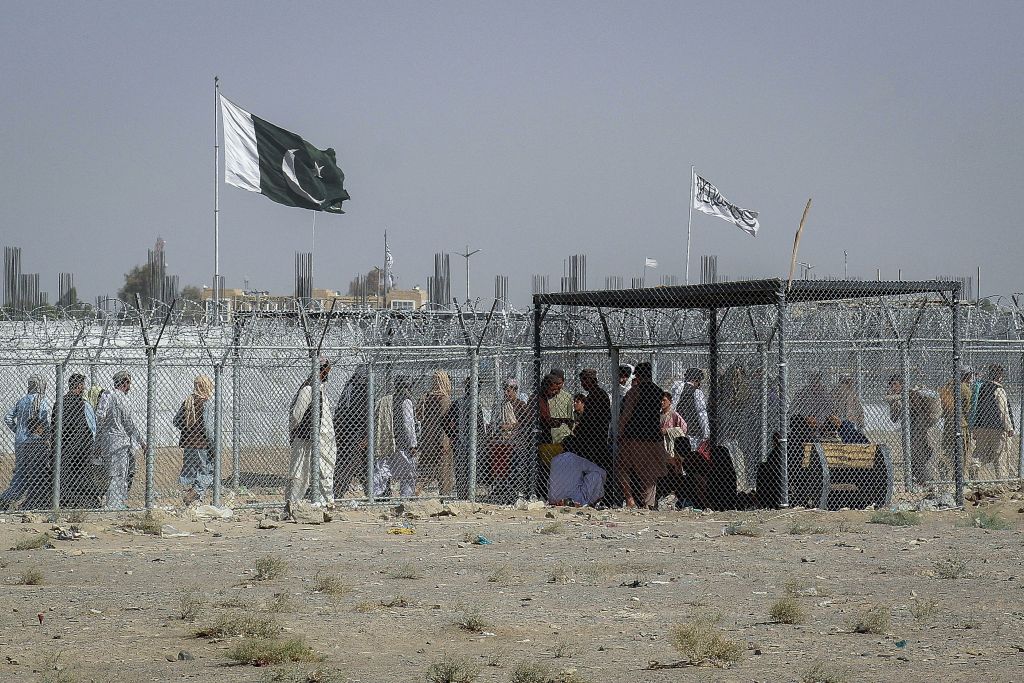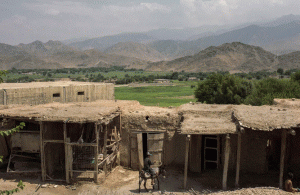Taliban flags are already flying in Islamabad. Among those hoisting the white flag of the group is the women’s madrassa Jamia Hafsa, affiliated with the adjoining Lal Masjid (Red Mosque), which has also released a song celebrating the Taliban as ‘the symbol of Islam’. Lal Masjid, a few miles from Pakistan’s military headquarters and parliament, has been an emblem of terror and factory of jihad in Pakistan since its formation in the 1960s.
The Lal Masjid cleric Abdul Aziz has in the past pledged allegiance to Isis and appeared to defend the 2014 Peshawar school attack which killed 141, mostly schoolchildren. When the army moved against Lal Masjid in 2007 it led to a nationwide explosion of terror attacks. When the Taliban took over the shrine of the freedom fighter Haji Sahib Turangzai near the Afghan border, they renamed it ‘Lal Masjid’ as a hat-tip to the Islamabad mosque’s jihad against the Pakistani state.
That same jihad is resurfacing in Pakistan. Imran Khan last week welcomed the Taliban takeover, saying Afghans had removed the ‘shackles of slavery’ and political leaders across the ideological divide celebrated the jihadist group’s triumph. The hordes masochistically basking in the Taliban’s glory appear to be oblivious to how close to home the threat has come.
Just as the US withdrawal was drawing closer, the Pakistani Taliban (TTP) began to resurface, with the group escalating its attacks after Donald Trump reached a deal with the Afghan Taliban last year. As well as imposing Islamic sharia in the tribal areas, the TTP and its affiliates have increased the frequency of terror attacks in Pakistan, with 149 attacks last year and over 100 this year already. The group claims to have carried out 26 attacks last month alone, killing 56 Pakistani security personnel.
The military establishment has long suggested that the Pakistani and Afghani Taliban can be differentiated — known as the ‘Good Taliban, Bad Taliban’ strategy — to justify support for propping up a radical Islamist regime in Afghanistan. The fact that the TTP has pledged allegiance to Afghan Taliban leaders, from Mullah Omar to Hibatullah Akhundzada, has never been an impediment to Pakistan’s bid to Islamize the region and counter the influence of ‘Hindu India’.
The establishment’s dedication to safeguarding jihadists can be gauged by how — even amid the Taliban resurgence in Afghanistan — Pakistan’s Supreme Court announced the release of the UK-born jihadist Ahmed Omar Saeed Sheikh, who was accused of being an accomplice to the murder of journalist Daniel Pearl in Pakistan. Islamabad even appears to be willing to risk alienating China, which has offered an economic lifeline to Pakistan, just to keep its jihadist superstructure intact.
As the Afghan Taliban began releasing TTP leaders from Afghanistan jails, it still hasn’t dawned on Pakistan’s leadership that perhaps the radical Islamist regime now has its eyes on a wider South Asian jihad.
Al Qaeda, whose founder Osama bin Laden has recently been lauded as a martyr in Islamabad, has already been in a covert alliance with the Afghan Taliban and enjoyed the allegiance of their Pakistani counterparts. TTP factions that had pledged allegiance to Isis in Pakistan have also been remerging with the Taliban. Even India-bound jihadist groups Jaish-e-Muhammad (JeM) and Lashkar-e-Taiba (LeT), having long overlapped with al-Qaeda and the Taliban in Afghanistan, are now shifting their operational bases from Pakistan, where they have been shackled by sanction warnings issued to Islamabad by the counter-terror watchdog Financial Action Task Force (FATF).
Having long treated nationalist movements in Afghanistan-bordering provinces of Balochistan and Khyber Pakhtunkhwa as threats to Pakistan’s sovereignty, the military establishment doesn’t appear to realize how the unification of these Taliban groups might be more menacing for its territorial integrity.
Along with the operational mechanism of jihad, the Pakistani establishment has also sustained the ideological framework needed to facilitate Talibanization. Imran Khan, for instance, hasn’t merely been paying tributes to jihadists, he has also been peddling Islamic modesty codes for women and vowing to export Pakistan’s gory blasphemy laws to the West. Even self-styled ‘progressive’ leaders have invoked Islamic injunctions to celebrate the Taliban’s win in Afghanistan.
In Pakistan, many of those who cry ‘Islamophobia’ when jihadist extremism is linked to Islam or Muslims are now basking in the Taliban’s glory. Instead of a Muslim-led delegitimizing of the Taliban, there has been widespread jubilation over an ‘Islamic triumph’ against the US. This fixation on the American role in the Afghanistan crisis is often peddled as justification for what Taliban have in store.
Indeed, the Taliban have already implemented Islamic sharia that relegates religious minorities and women to an inferior status, with ‘protection’ used as a misnomer for subjugation. This is especially appalling for the violently patriarchal, Muslim supremacist Pakistan which, despite being excommunicated as an infidel state by the Taliban, and having had jihad declared on it, still thinks its best interests lie in supporting the Taliban.
This article was originally published on The Spectator’s UK website.


















